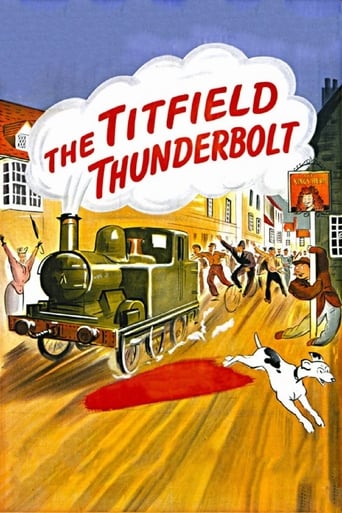Adam Peters
(75%) A fine British comedy that is English as a rainy summer day. This really is a joy to watch with its fantastic pacing, eccentric characters, and a charming fun wit running right the way through. And despite this being incredibly twee with its chocolate box village, there is a rebellious spirit that bubbles to the surface that is present in many of these great Ealing films. It must be said this isn't what I'd call the funniest film of all time, or even the funniest Ealing film, but it's just so watchable and and likable, with the brilliant line from Stanley Holloway: "Is it a pleasant prison?" all making this a very worthy watch.
l_rawjalaurence
Shot in Technicolor - still rather unusual for Ealing Studios - THE TITFIELD THUNDERBOLT returns to a familiar theme explored in earlier movies such as WHISKY GALORE! (1949) in which a tight-knit community triumphs over bureaucracy. In the earlier film the subject was Scotch whisky; in this film the focus of contention is the proposed closure of a rural branch line linking the small village of Titfield to a main junction. Not many commuters actually make use of it; but the line as a whole symbolizes a tradition which, for the villagers at least, should not be discontinued. If it were to close, then Titfield would be overrun with traffic instead.Led by enterprising businessperson John Gregson, and supported by vicar George Relph and dipsomaniac landed gentleman Stanley Holloway, the village challenges the Ministry of Transport. Inevitably there are those who oppose their initiative, especially bus-owner Alec Pearce (Ewan Roberts) and his snake-like sidekick Crump (Jack MacGowran). Despite their best efforts to sabotage the railway, aided by disgruntled steamroller driver Hawkins (Sidney James), the line is saved, even though the locomotive pulling the train is the eponymous Titfield Thunderbolt, a late nineteenth century "Puffing Billy" with a maximum speed of twenty-five miles per hour.Director Charles Crichton makes us aware that this is a wish- fulfillment film - at the end we see a shiny new steam locomotive pulling several coaches, an emblem of the present (and the future) of Britain's now-nationalized railway network. From now on locos like the Titfield Thunderbolt will be operated by groups of enthusiasts for tourism purposes (as is still the case today in many parts of the country).Nonetheless the film remains an enjoyable experience to watch, notably for its evocation of an unchanging pastoral world (cinematography by Douglas Slocombe) and a clutch of memorable characterizations, including Naunton Wayne as a city lawyer who cannot make up his mind whether to support or oppose those wanting to keep the line open. In one memorable sequence he wakes up in the middle of the night with a start, convinced that he heard something untoward happening. He looks round and then goes to sleep with a terribly worried look on his face, as if feeling that he has not done his duty. However his fears are dispelled later on in the film, when Holloway tells him that he has done good work in helping the Ministry of Transport inspector to give a favorable report on the line. Wayne looks to the left of the camera and his features break into a big smile - perhaps for the first time, he understands that he has been of some use to his community.Like most Ealing comedies, the action of THE TITFIELD THUNDERBOLT unfolds at a brisk pace, covering up the screenplay's basic logical implausibilities (why would the Ministry keep such an archaic branch line open anyway?). The film remains a pleasant experience to watch.
d_m_s
A very brief old film, at only 1 hour 20 minutes long. Even so, I still felt there was around 10 minutes of padding. At the end my initial thought was "is that it?" as it does feel quite a pointless film.The film opens up with lovely countryside shots full of beautiful colours and looks really nice. I suppose, even though towards the end it did feel like it was being padded out a bit, the film dives in to the storyline and moves along at a good pace generally.Stanley Holloway's portrayal of the local well-to-do philanthropist is very entertaining and he by far has the best lines and gives the best performance. Other than that there's not really much to it. The occasional use of blue screen technology is, as you can imagine, not great. There's no real drama in the plot as there's never really any dilemma for anyone to deal with - whenever something goes wrong with the train, hordes of the locals appear from out of nowhere, help remedy the problem then disappear again. They literally do appear out of nowhere. More than once the train breaks down in the middle of fields miles away from anywhere and from out of the trees and bushes appears the townsfolk to lend a hand then disappear again when not needed - very bizarre!
pjm-16
The working class stereotypes, written in by middle class script writers, are lazy, dishonest and untrustworthy( ala Hue Griffiths) or simply stupid (Syd James). The vicar and other village bigwigs have much more admirable qualities as have the other middle-class characters.It all takes place in a kind of idealized world that never really existed, yet still manages to make many present day people feel nostalgic for a past that never was.This kind of class racism is alive an well on BBC Radio 4, if you care to listen to their so called (middleclass) dramas and has been a common feature of many British films in the past.




